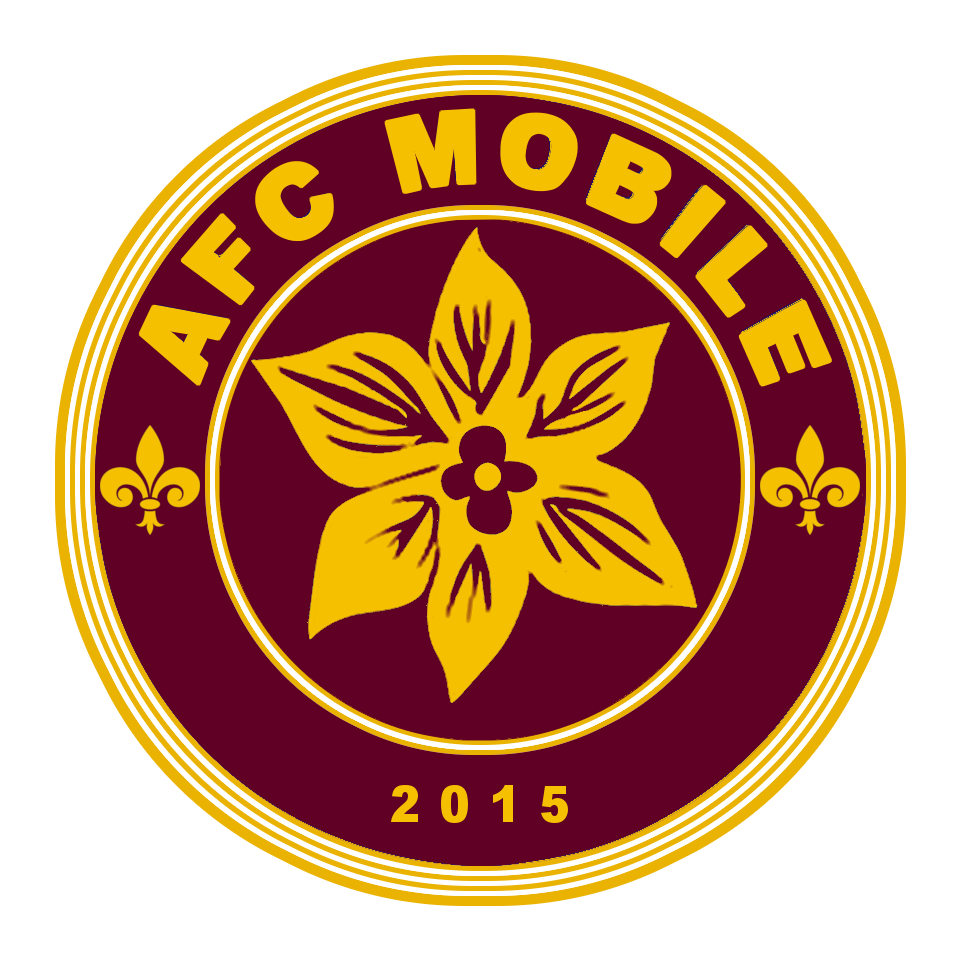From the first kick of practice, Nate Nicholas is in motion. Arms folded, pacing, towering over most of his new AFC Mobile squad, bellowing over the sound of his drills. “Faster,” he says. “Always faster, always more pressure, always more shots.”
“My favorite team is Liverpool and Jurgen Klopp likes to play the way I like to play,” Nicholas said. “He’s a little more committed to it than I am, but I like to high press. I like high energy. I like everything to be fast. I like quick passing like Pep Guardiola, but I don’t like passing for passing’s sake. I want to get forward as quickly as possible, press the ball as quickly as possible, keep it on their side as much as possible. I like to keep the ball and for it to look pretty, but most of all, I like to win.”
Nicholas’s high-speed style goes all the way back to his days as a well-recruited club player. He was born in Hattiesburg, Mississippi, but moved all over the country to follow his father’s work in the oil fields before settling in Slidell, Louisiana for his high school years. There, he garnered enough attention to draw scholarship offers from William Carey, Belhaven, and The University of Mobile, among others.
“If I had stayed in Hattiesburg, I probably wouldn’t have reached the level I did, but I moved to Texas and California, which are hotbeds for soccer,” Nicholas said. “I played everything growing up. Every season it was… I wanted to be Major League in whatever that was, but I was always naturally gifted toward soccer. I always excelled more in that. Soccer was just always the one that I was the best at.”
As a player, Nicholas brought his father’s oil-field work ethic to bear on his opponents. His natural talent was augmented by his love of physical play, his speed, and his six-foot-plus stature. His desire earned him four years of play at the University of Mobile, where he became a crucial part of the 2002 national championship-winning Rams team.
While at the University of Mobile, Nicholas played under coach Peter Fuller, who would go on to oversee the academy of the Philadelphia Union in MLS, where he also served as a first-team assistant. Fuller’s tutelage shaped his nascent coaching career, when Nicholas took a job at the Alabama School of Math and Science during his junior season with the Rams.
“That was a fun one,” Nicholas said. “It was an interesting group of kids. You never expect to go to a soccer game and hear about flux capacitors and all kinds of crazy science and math stuff.”
Nicholas stayed at ASMS for two seasons before accepting an assistant coach position at UMS-Wright in Mobile, motivated by a desire to stay in his adopted home town. There, his career nearly ran into a dead-end. Desperate to find a head coaching job, he left Old Shell Road for the head coaching job at Baldwin County High School.
“That was one rough, miserable year in my life,” Nicholas said. “They were good kids, but it was an interesting experience in my life. It was a very unique situation. I wasn’t sure what I was getting myself into, and I was still young, so leading a program at a school like that, that’s a little bit country, maybe not soccer oriented, was different for me because everywhere I’d been before was fairly soccer-minded.”
His team won just two games. He left after just one season to return to UMS-Wright as the head coach. Ignoring his own doubts about his career, he took over a team newly promoted to the 5A division, into a crowded area dominated by arch-rival St. Paul’s Episcopal, a high school sports juggernaut. In that first season, his team won both fixtures against the Saints en route to a state runner-up finish, dispelling any doubts the burgeoning star might have had about his career.
For the next three years, Nicholas’s team was ranked No. 1 in the state. He won back-to-back state titles, took down 6A powerhouses, and established UMS as one of the top teams in the Southeast. After the 2012 season, Nicholas traveled down Old Shell Road for a new challenge as head coach of the McGill-Toolen Catholic High School boys, who he has since led to a state runner-up finish.
“The crazy thing is, I was the same coach for a 2-15 team as I was for a state runner-up team,” Nicholas said. “It just shows how important players are to a coach. Without good quality players, the best coach is nothing. Even a bad coach can look good with quality players.”
As a coach, Nicholas has won more than 150 games at the high school level, driven by his undying competitive instinct. But his career, including his decision to become the first coach in AFC Mobile’s history, is driven by a deeper desire–to teach his players and pass that competitiveness and resolve on to his teams.
“There’s nothing more annoying to me than seeing a coach that’s in it for himself,” Nicholas said. “That’s very against what I am. I enjoy accolades and winning, and I would be a fool to say I don’t, but I don’t want it to be about me. I want it to be about the team and our goals, not my goals. If I preach to my team that the team’s goals will lead to your individual goals, and I don’t believe that myself, then I’m a hypocrite and I don’t want to do that. I want to practice what I preach.”
His goals for AFC Mobile are simple.
“Win. Win every game,” he said. “I want everybody to be like ‘Oh crap, Mobile’s here, and they’re going to win it, as long as they’re in it.”













